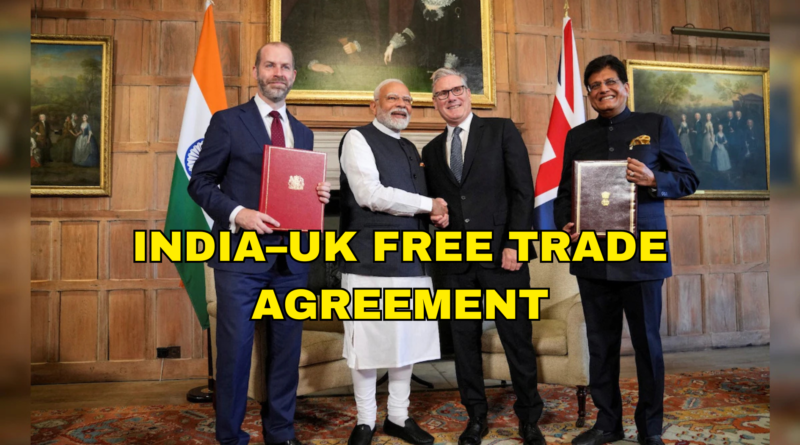INDIA-UK FREE TRADE AGREEMENT: A LANDMARK DEAL SIGNED
In a historic move, India and the United Kingdom officially signed a comprehensive Free Trade Agreement (FTA) on July 24, 2025. This agreement marks a significant milestone as it is India’s first full-spectrum trade pact with a European nation. The FTA aims to boost bilateral trade, investment, and economic cooperation by reducing or eliminating tariffs and other trade barriers across key sectors. Signed in London by Indian Commerce Minister Piyush Goyal and UK Business and Trade Secretary Kemi Badenoch, the deal symbolizes a deepening of economic ties between the two democracies.
One of the standout features of the agreement is its strong emphasis on tariff reductions. Over 90% of Indian goods will now have duty-free access to the UK market, including textiles, pharmaceuticals, and engineering products. Similarly, the UK will gain preferential access to Indian markets for automobiles, premium spirits, and advanced machinery. The deal is expected to double bilateral trade, currently valued at around $38 billion, within the next five years.
Services have received special attention in this FTA. With both India and the UK being service-driven economies, the agreement facilitates easier visa norms, mutual recognition of qualifications, and improved mobility for professionals such as IT experts, accountants, and legal consultants. This provision is expected to benefit India’s skilled workforce significantly, while also helping UK companies bridge talent gaps in critical industries.
Investment flows are also set to increase under this deal. The FTA includes measures to protect and encourage foreign direct investment, promote joint ventures, and enable smoother cross-border transactions. Indian startups and small businesses will especially benefit from enhanced access to UK investors and technology. The UK, on the other hand, is eyeing opportunities in India’s rapidly growing green energy and digital sectors.
The agreement includes provisions for cooperation in emerging areas like digital trade, data protection, intellectual property rights, and sustainability. Both countries have committed to upholding high standards of environmental protection and labor rights. This positions the FTA as a modern, forward-looking trade pact that goes beyond traditional goods exchange and aligns with global trade norms.
Strategically, the FTA is a geopolitical win for both sides. For India, it signals its readiness to engage deeper with developed economies and reduces its reliance on China-centric trade routes. For post-Brexit Britain, it’s a much-needed success in its efforts to redefine global trade partnerships and strengthen ties with Indo-Pacific powers.
Political leaders on both sides have hailed the agreement as a game-changer. Indian Prime Minister Narendra Modi called it a “visionary partnership for growth and innovation,” while UK Prime Minister Rishi Sunak said the deal “cements a new era of economic collaboration.” Industry leaders, too, have welcomed the move, expecting a surge in exports, job creation, and innovation.
The India-UK Free Trade Agreement stands as a testament to the evolving dynamics of global trade in the 21st century. As implementation begins, both nations are preparing for a new chapter in economic engagement-one that promises mutual prosperity, stronger political ties, and increased cultural exchange between two long-standing partners.




